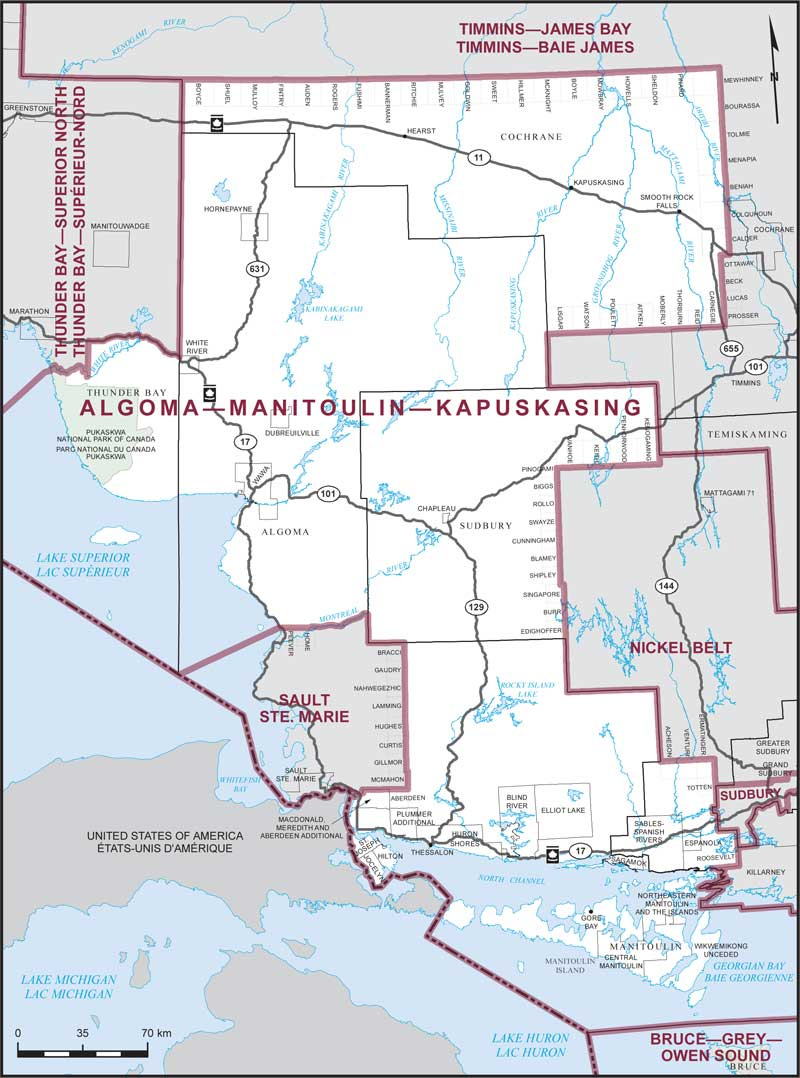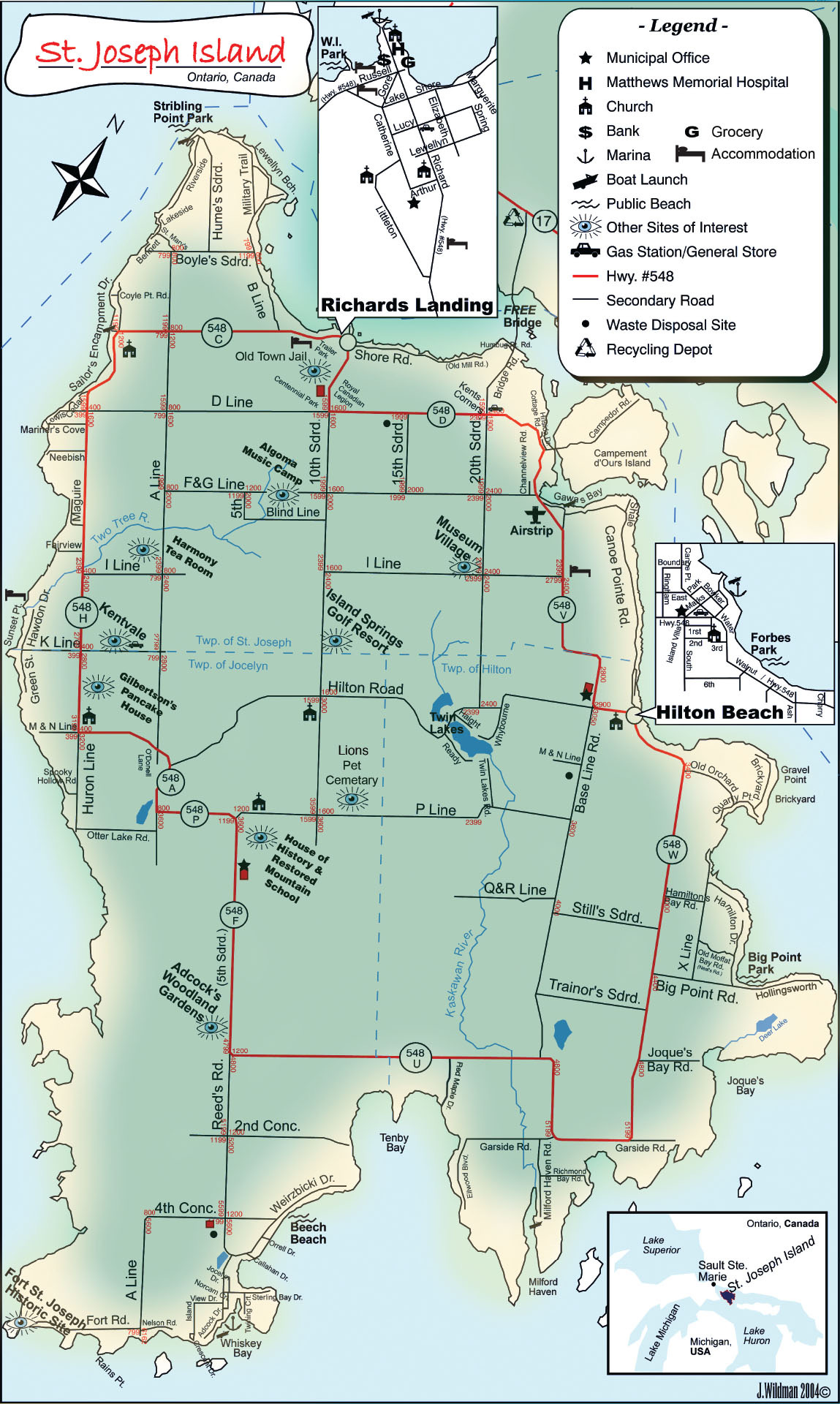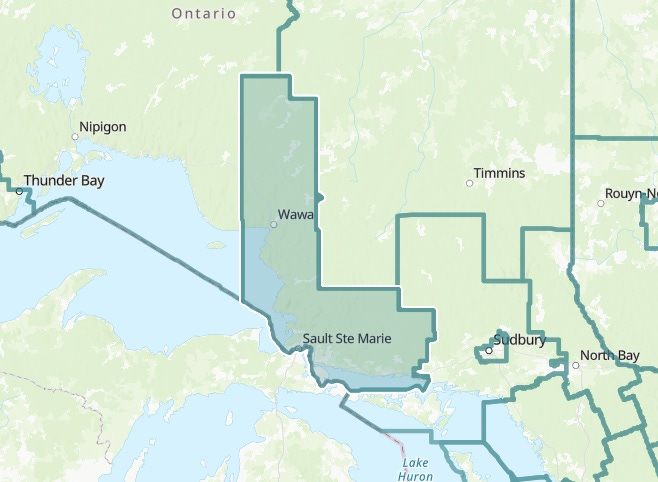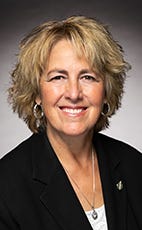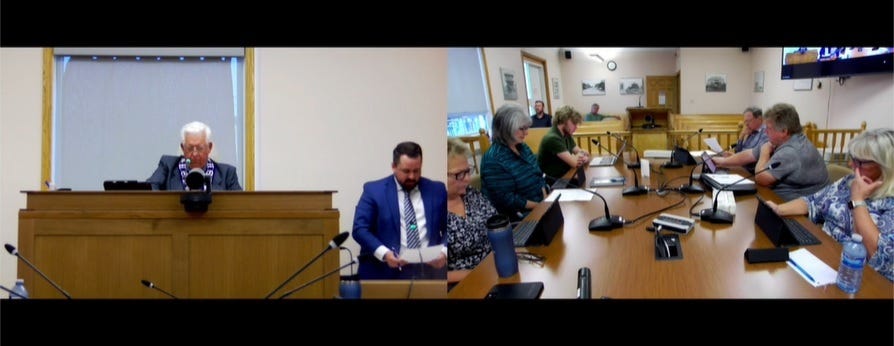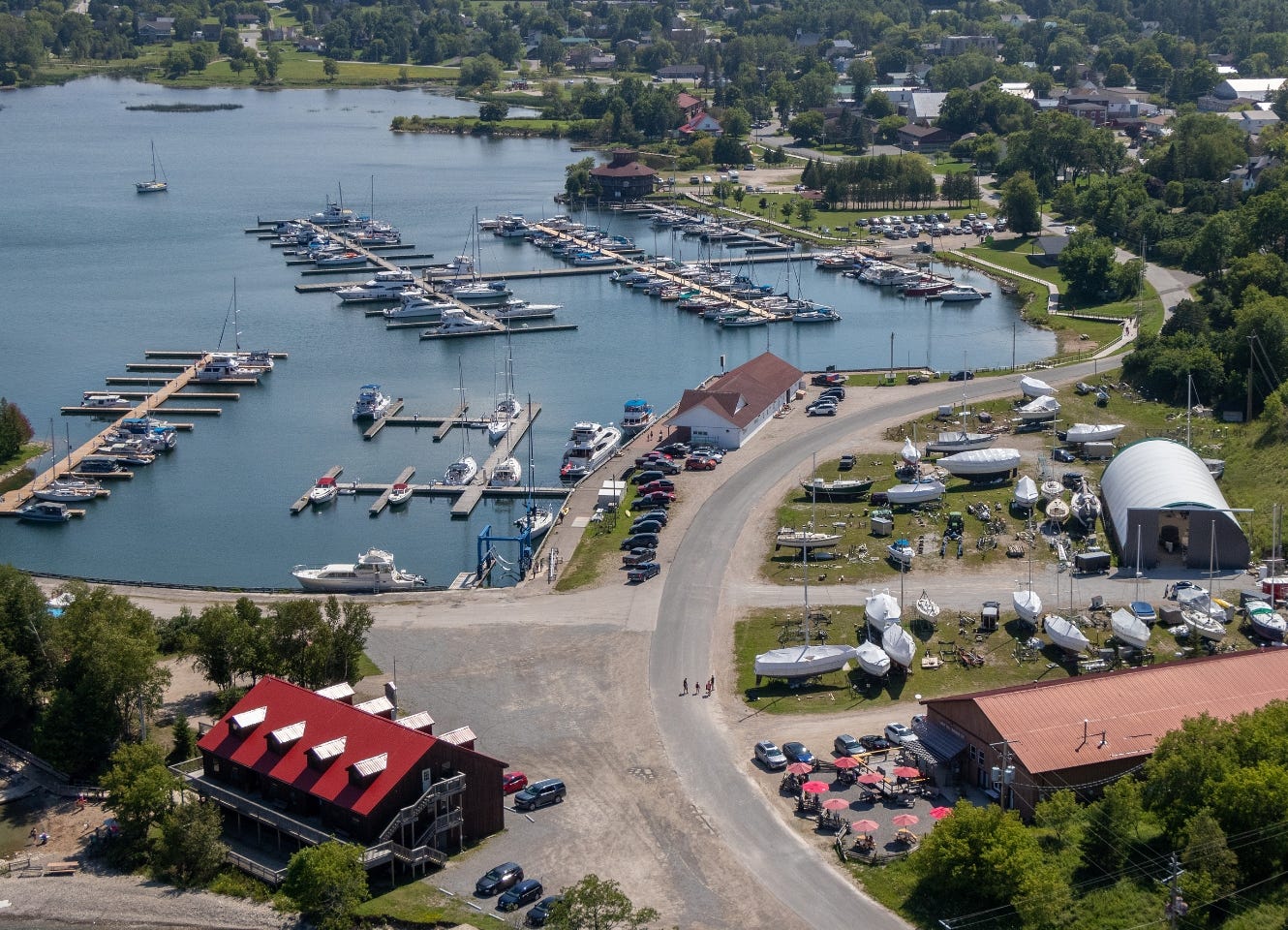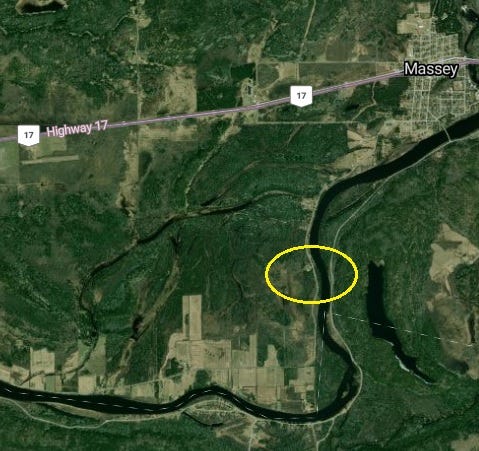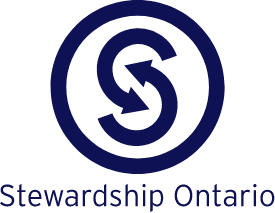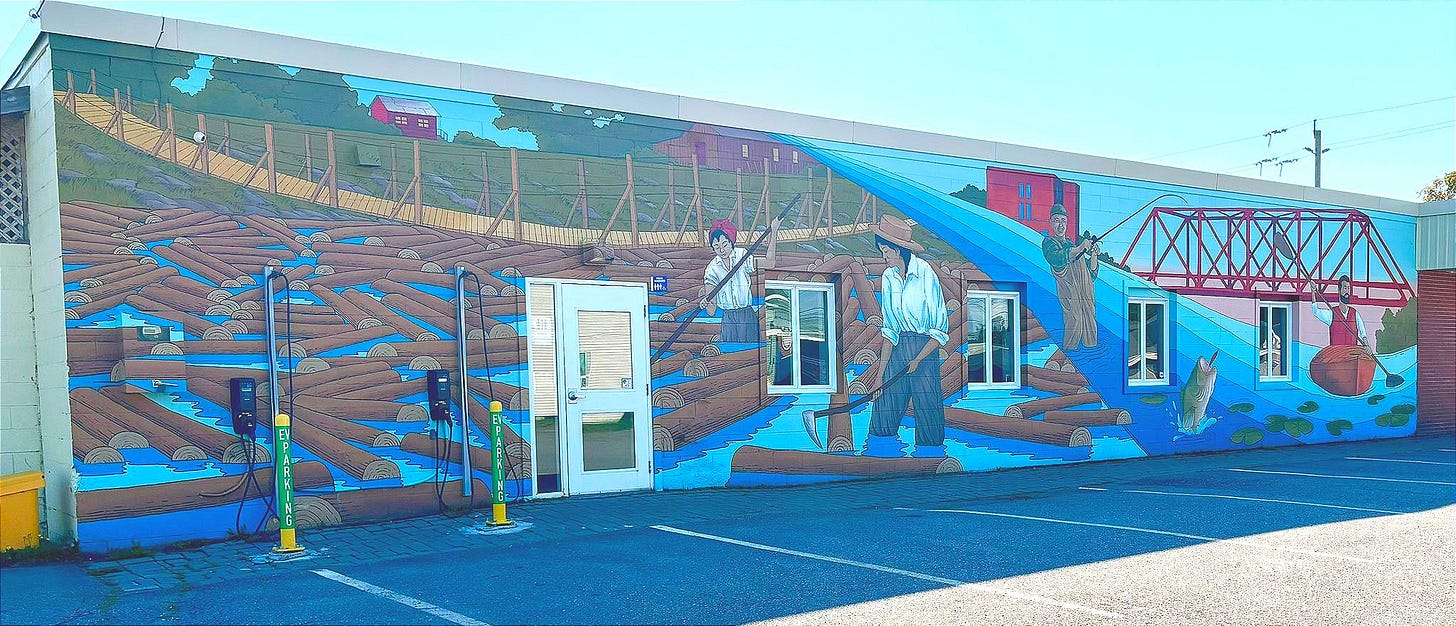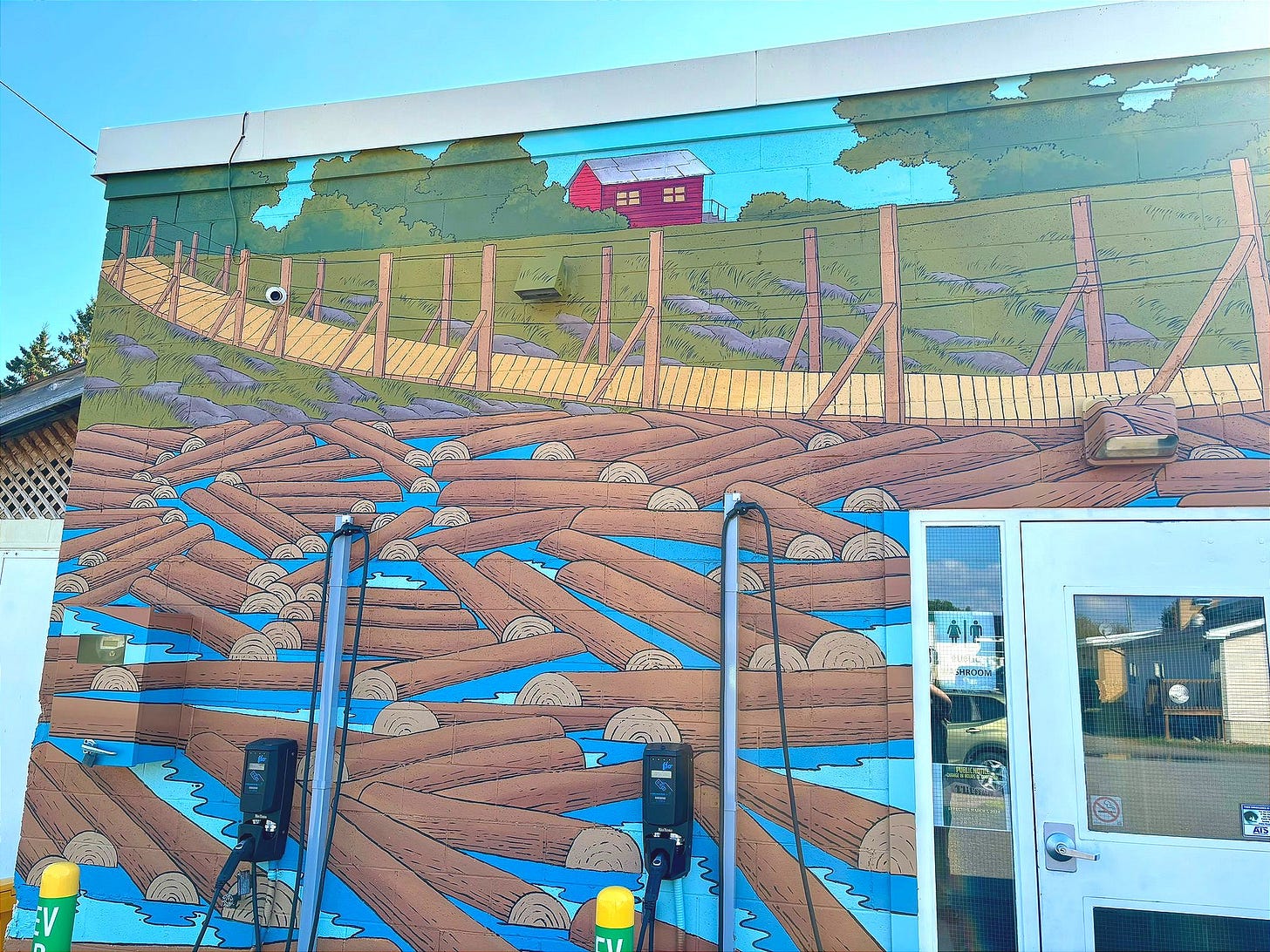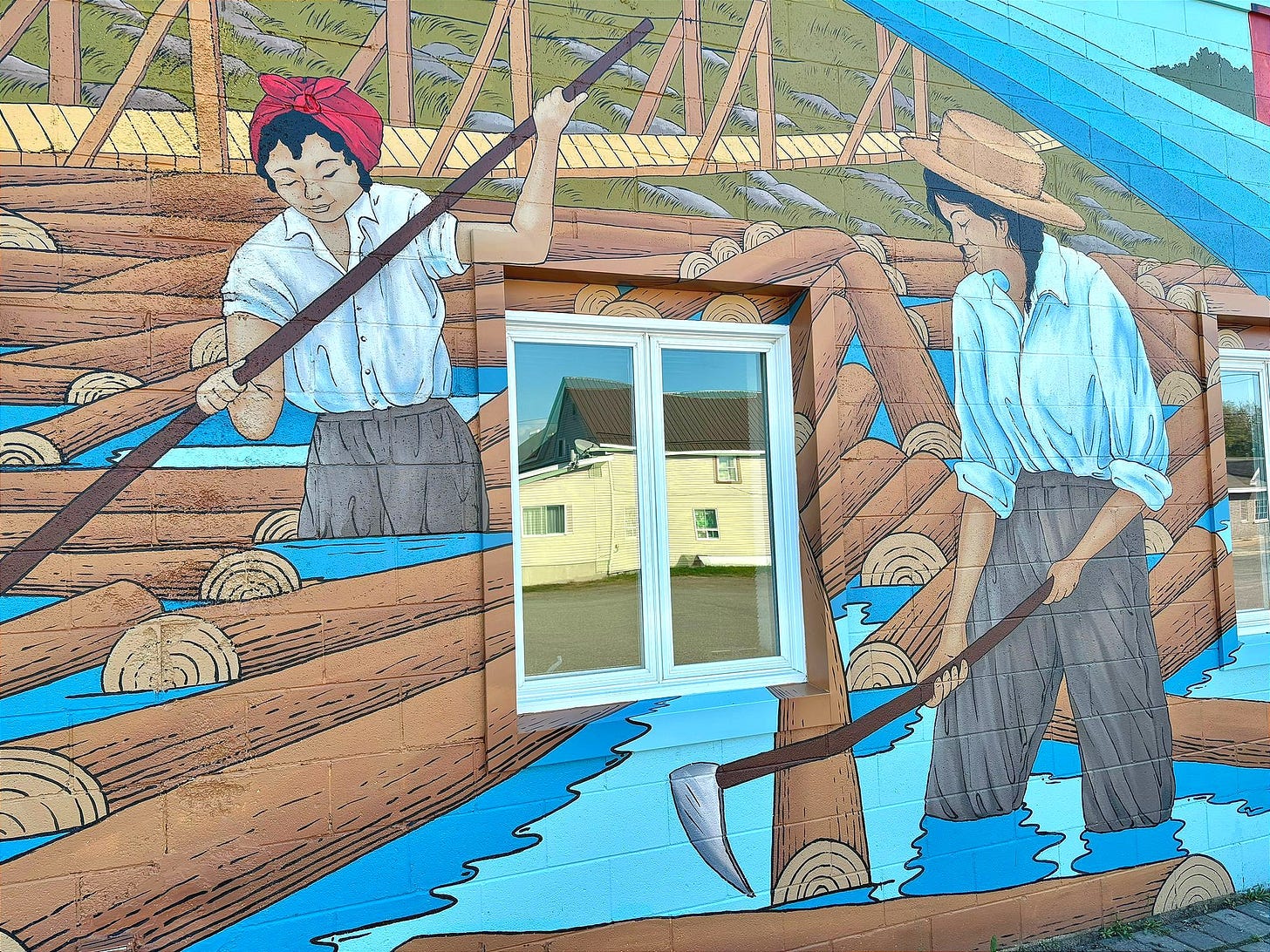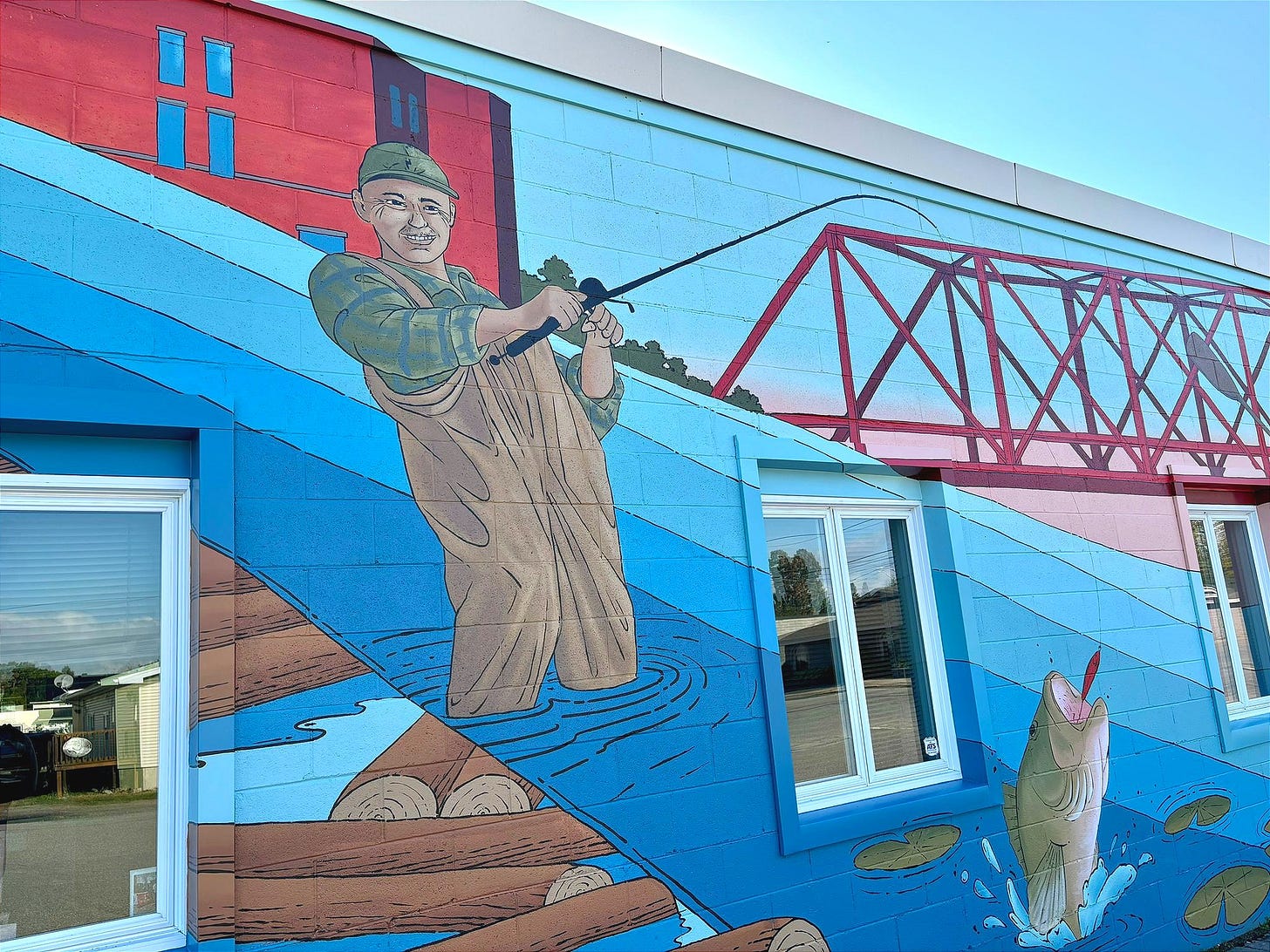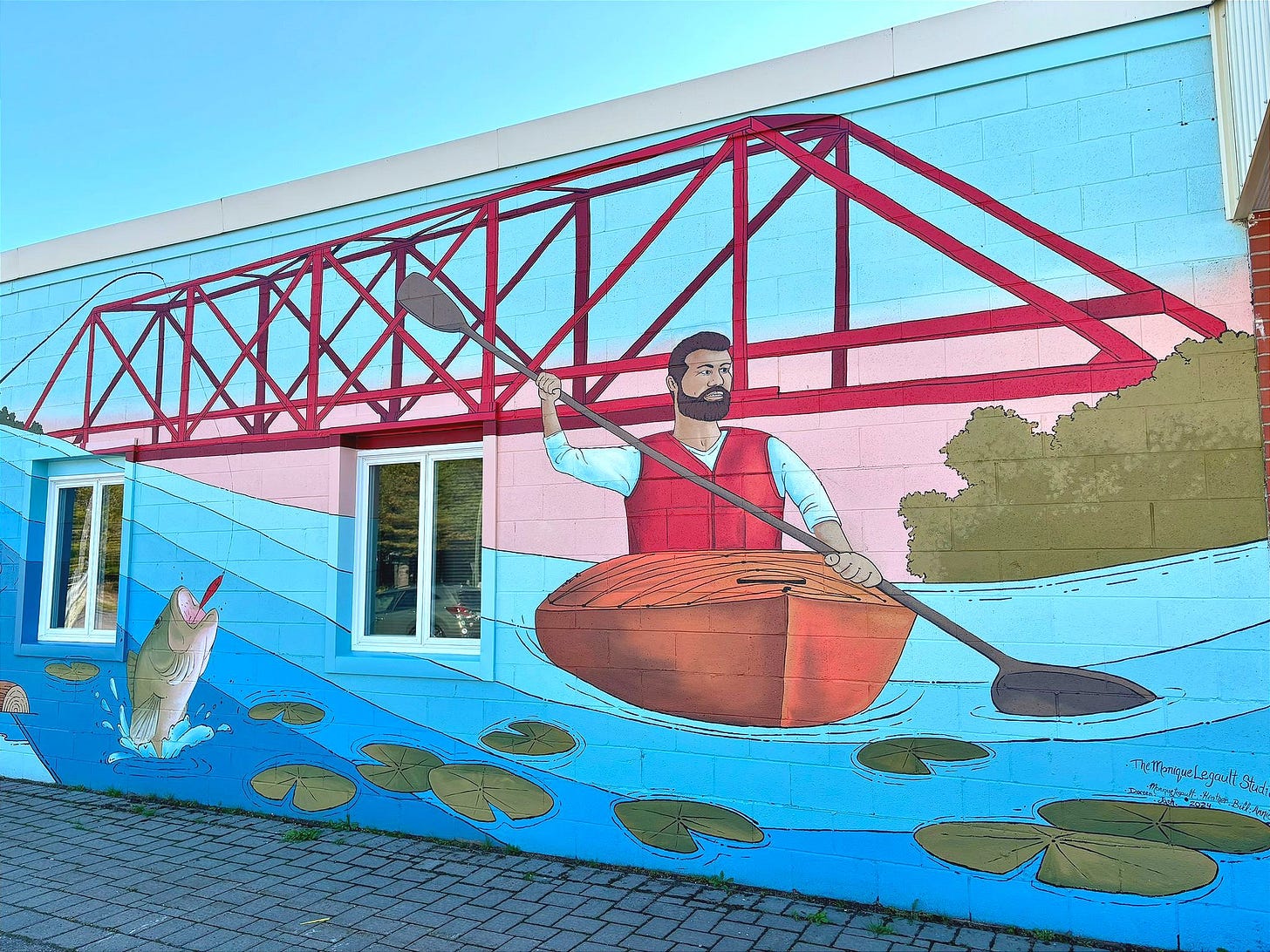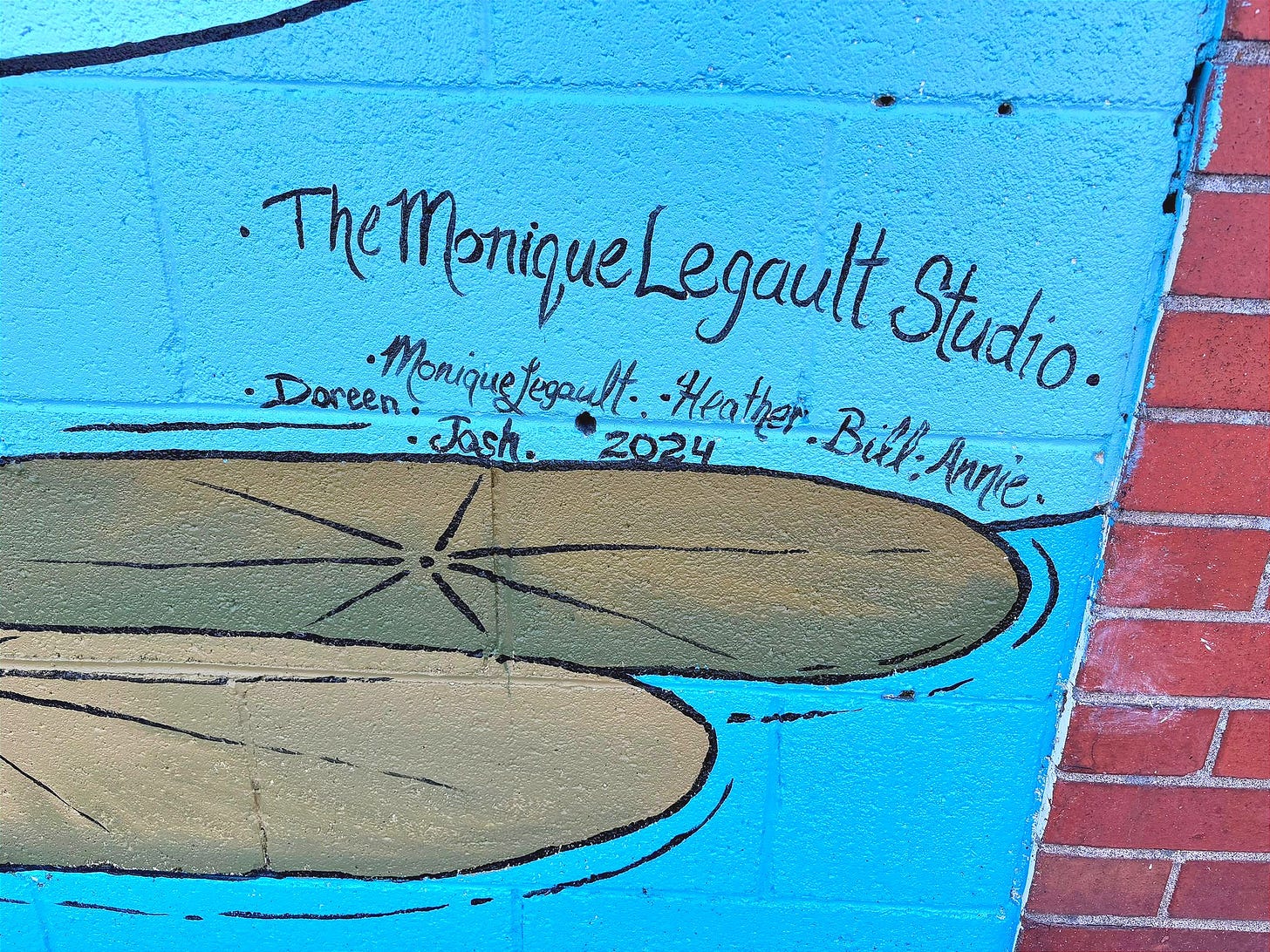Shore Report acknowledges the North Shore of Lake Huron is the traditional land of the Anishinabek and the Métis Nation. This is Treaty 61 (Robinson-Huron) territory. Anishinabek have lived in the Great Lakes region for thousands of years. Shore Report is very grateful to live and work here.
Autumn has Arrived on the North Shore… Sort Of
Environment Canada tracking suggests this September was the warmest on record for the North Shore of Lake Huron. October looks to break records as well. For Shore Report staff, this has meant a blessed extension of the swimming season in the north channel, but it’s increasingly difficult to put climate change concerns out of one’s mind.
As we look back on local happenings leading to October, allow us also to take a moment to honour Canada’s National Day for Truth and Reconciliation on Monday, September 30th.
Image courtesy Canada.ca
THANK YOU to everyone who subscribed to Shore Report after our first issue was released. You’ve shown us there is a real interest for this kind of coverage and focus on local government. As you know, we’ve started with these shorter print stories, but are likely to expand into longer investigative pieces, podcasting (well… MORE podcasting, as we already put some audio up as a promo), and video as well. And this issue, we start off with an editorial because the work we did this past month led us to an uncomfortable question. Feel free to respond, though let’s keep everything civil in the comments. Comments that cross our lines of civility will be removed.
We continue to share some stories for free (including this entire second issue) as we build our readership, but hope you’ll take a paid subscription for the full experience. Thanks to everyone who already took the paid subscription. We believe that local media coverage is an asset worth paying for, and we’re very reasonably priced. Hope you agree.
Please subscribe now (and tell your friends and neighbours to subscribe as well!).
All written content in this issue is © Shore Report 2024
Editorial
Has the North Shore Been Gerrymandered?
Goodbye to a northern riding. Image courtesy Elections Canada
Two of this month’s Shore Report stories might leave a bad taste in the mouth, and it’s a foul flavour that seems to have been added by the cooks at Queen’s Park. A letter from local MPP Michael Mantha to Ontario Premier Doug Ford concerning delays to the Little Current Swing Bridge replacement project suggests the provincial government makes decisions about the northern part of this province based on the colour of the local electoral map. Mantha, who was elected as an NDP member but has since become an Independent, quotes the Premier saying “the biggest issue [in the project delay] is that Algoma—Manitoulin does not have an MPP who is a member of the Progressive Conservative Party of Ontario.”
Combine that with the disappearance of the Algoma—Manitoulin—Kapuskasing federal riding resulting from the latest Federal Electoral Boundaries Commission recommendations — ultimately a provincial decision — and one begins to wonder if Northern Ontario is being punished for the way we vote. As MP Carol Hughes worries in this issue’s piece about the lost riding, rural and small-town North Shore communities are now at risk of losing their voice in Parliament. And it’s hard to ignore that somehow in the shuffle, the province of Ontario has eliminated a riding that fairly consistently votes for opposition parties.
This redistricting was done over the express objections of our elected representatives. Northern MPs Carol Hughes (Algoma—Manitoulin—Kapuskasing), Charlie Angus (Timmins—James Bay), Viviane Lapointe (Sudbury), Marc Serré (Nickel Belt), and Terry Sheehan (Sault Ste. Marie) all appeared before a Parliamentary hearing and registered complaints about the proposed redistribution. According to the Standing Committee on Procedure and House Affairs (PROC) report from that hearing:
“Common between all five objections was a strenuously made contention that their region should not lose one federal seat because of the numerous harmful effects this would have on established communities of interest and identity, the historical pattern of ridings, and meaningful representation for residents.”
The federal PROC committee sided with our MPs, and recommended their objections be considered favourably. Notably, federal Conservatives dissented on that recommendation and called for elimination of the solidly NDP riding.
Ultimately, the decision on Algoma—Manitoulin—Kapuskasing came down to the three-person Federal Electoral Districts Redistribution Commission, a body that is intended to be non-partisan… and certainly appears to be. Chaired by a Superior Court Judge, and filled out by two well-respected professors of Political Science, it would be hard to make a case for partisan meddling in the process. This does not appear to be a case of what our American neighbours call gerrymandering. The practice of nakedly partisan redistricting of voting blocks down south is named for former US Vice President and Governor of Massachusetts, Elbridge Gerry, who signed a redistricting so absurd it created a voting zone in the shape of a salamander.
But there is one important element missing from the Commission that took away our northern riding… northernness. Not a single member of the Commission appears to have any significant experience with Northern Ontario. So, intentional manipulation? Likely not. But a case of unconscious Southern Ontario bias? All too likely. The idea that something vital can be shifted south because the north won’t really miss it sounds — to this northerner who grew up in the south — very familiar indeed.
Mississauga First Nation Looks to the Skies
Drone Logistics Project Discussed with Port Perry Company
Image courtesy Sky Canoe
The Community Economic Development Committee (CED) for the Mississauga First Nation (MFN) is encouraging band members to start their own drone logistics business in partnership with the MFN and Port Perry company Sky Canoe.
Sky Canoe, an indigenous-owned cargo aircraft supplier produces Short Takeoff and Landing (STOL) and Command-Directed Remotely Piloted Aircraft Systems (RPAS) for delivery of cargo, food, medical supplies, and other essential goods across Canada’s north. The Nimkii, Sky Canoe’s flagship craft has a remote range of 800 kms and can fly in temperature conditions as low as -35C.
Image courtesy Sky Canoe
MFN’s September CED Report contains a call for interest in partnering on the initiative, which looks to revolutionize how remote communities in the north are serviced.
Township of North Shore Supports Stricter Harassment Penalties
Bill 207 Being Discussed in Municipalities Across the Province
Image courtesy The Women of Ontario Say No
A Bill brought to the Ontario Legislature by Niagara Centre NDP MPP Jeff Burch has been officially supported by the Township of the North Shore. Bill 207, the Municipal Accountability and Integrity Act, 2024 calls for amendments to the Municipal Act aimed at strengthening local codes of conduct around workplace harassment, discrimination, and violence. MPP Burch is the provincial opposition critic for Municipal Affairs.
The proposed amendments closely mirror recommendations of advocacy group The Women of Ontario Say No (TWOSN), which notes limitations to the penalties municipal Integrity Commissioners and Councils may impose on Councillors found to have engaged in egregious workplace conduct. According to TWOSN, “Currently, if your municipality’s Integrity Commissioner confirms a councillor perpetrated harassment (sexual, emotional, and/or psychological), no matter how serious, the councillor can keep their job and still seek re-election.”
Bill 207 recommends penalties up to and including the vacancy of a Councillor’s seat and a ban on re-election for at least two election cycles. A similar piece of legislation, Bill 5, The Stopping Harassment and Abuse by Local Leaders Act, was defeated at Queen’s Park in May 2023.
North Shore Council passed a Resolution of Support for Bill 207 at its September 4th meeting, despite a motion to defer the vote by one Councillor who wished for more information before voting. As well, during Council’s question period time, an objection to Council’s support was raised by an Algoma Mills resident who felt the recommendations from TWOSN targeted male Councillors only.
New Trailer Restrictions on St. Joseph Island
Licence Required after 14 Days
Trailer responsibly, please. Image courtesy waterfronttrail.org
The Township of St. Joseph Island is cracking down on the permanent and semi-permanent use of trailers as living and working spaces on the island. At its September 4, 2024, meeting, the Township of St. Joseph Council voted to amend a local by-law (2024-28) making it an offence to maintain a travel trailer outside of an overnight trailer camp for more than fourteen days without a permit.
What’s more, the placement of construction trailers on any site without official approval of the Township is now an offence. Storage of unused travel trailers is also now restricted to one for a residential lot, and four for a rurally zoned piece of land.
Licences for trailers outside these restrictions may be granted on a month-by-month basis for an absolute maximum of six consecutive months, subject to assessments around shoreline setback requirements, waste management, the attachment of permanent additions such as decks or sunrooms, and the general appearance of the site. Site inspections are authorized under the by-law, and those found maintaining a semi-permanent trailer without a licence will be “guilty of an offence and liable to the penalty provided herein.”
What Do We Lose in Electoral District Shuffle?
North Shore MP Carol Hughes Registers Her Riding’s Objections
The North Shore’s series of new riding divisions. Image courtesy Federal Electoral Boundaries Commission
Lake Huron’s North Shore region is still coming to terms with the knowledge that its predominant federal riding, Algoma—Manitoulin—Kapuskasing, will not be contested by any candidates in the next federal election. In a controversial provincial shuffle of electoral districts, the riding currently represented by NDP Member of Parliament Carol Hughes will be eliminated and divided into expanded neighbouring ridings Sault Ste. Marie—Algoma, Kapuskasing—Timmins—Mushkegowuk, and Sudbury East—Manitoulin—Nickel Belt. Hughes has announced she will retire from politics altogether, rather than seek out another riding.
This is a net loss of one full riding for Northern Ontario (from 10 currently, to 9), and the creation of two massive far north ridings, the aforementioned Kapuskasing—Timmins—Mushkegowuk and Kenora—Kiiwetinoong which will represent a population of approximately 37,000 while spanning the province from Manitoba all the way to Quebec.
At Parliamentary hearings considering the proposed shuffle, MP Hughes submitted a number of objections that were gathered with similar complaints from five other Northern Ontario MPs in a report from the Standing Committee on Procedure and House Affairs.
Shore Report contacted Carol Hughes, who opposed the riding changes, to ask what’s being lost in the shuffle.
Local MP Carol Hughes. Image courtesy ourcommons.ca
“It is obviously a huge loss for people across Northern Ontario,” Hughes said. “One less riding means one less MP in the House of Commons representing the interests of people from Northern Ontario. It means giving people less access to their MP, which will impact people in rural communities like Spanish and Gore Bay, who don’t have access to Service Canada offices and rely on an active MP to act as their bridge to federal government services like passport applications, immigration, and anything related to the Canada Revenue Agency.”
The lack of Service Canada outlets for many shore residents points to a unique feature of the lost riding. Hughes describes an urbanization of the new riding make-up.
“Algoma-Manitoulin-Kapuskasing, as it currently exists,” she notes, “had the benefit of being a riding composed entirely of small towns, rural municipalities, and First Nations. I’m not suggesting whoever becomes the next MPs for the three expanded ridings won’t make efforts to try to effectively represent their constituents in these communities. Far from it. But I think there’s a challenge that wasn’t present before in trying to represent the interests of a city like Sault Ste. Marie while also ensuring that people in Elliot Lake still feel like their voices are being heard in Parliament.”
Much has been written worrying that the north’s new super-ridings will simply be too much territory for one MP to cover. An earlier proposal to cover the entire north with just one riding was adjusted. Hughes is concerned North Shore communities now having to compete for attention with a more populous urban center like Sault Ste. Marie or Sudbury could suffer similarly to far north communities, because of attentions far too divided.
“It may also pose a challenge as to how often MPs will be able to be present in the communities of the new boundaries,” she worries. “That’s my biggest concern when it comes to those communities along the North Shore and throughout the new riding boundaries. I don’t want those voices to be lost in Parliament, and I don’t want people in those communities to feel disenfranchised.”
In her Committee appearance, Hughes noted that Franco-Ontarian concerns may also be lost in the shuffle, since that population tends to be in the smaller communities.
While the Parliamentary Report declared “electoral districts must have a manageable geographic size, in cases of sparsely populated, rural or northern regions,” it’s not clear this priority was respected in the riding shuffle, given the proposed enormity of the two far north ridings.
The federal committee supported Hughes’s objections and recommended that the Ontario commission responsible for the proposed change “consider it favourably.” Despite that, Hughes notes, “the Federal Boundaries Commission had the final say, and the riding was eliminated.”
Shore Report plans an in-depth exit interview with Carol Hughes at her retirement.
North Shore Mayors Greet Medical Students
NOSM Event in Elliot Lake
Image courtesy NOSM
On September 3, Elliot Lake held its now traditional welcome dinner for Northern Ontario School of Medicine (NOSM) students beginning Comprehensive Community Clerkship (CCC) duties in the area. This year representatives from other nearby communities (Thessalon, Huron Shores, and Blind River) came along.
CCC duties are seen as crucial for giving young medical professionals a solid understanding of the unique conditions and challenges of northern community healthcare. The welcome event stresses that as well, but also gives insight into the joys of living and working in the region.
NOSM University has campuses in Thunder Bay and Sudbury, and follows a mission “to improve the health of Northern Ontarians by being socially accountable in our education and research programs and advocating for health equity.”
Thanks to Elliot Lake Today for this comprehensive coverage of the event.
Espanola Lobbies the Province on Local Health Care Costs
Recent Motion Aims to Reduce Burden for Locals
Espanola Town Council meeting on September 10. Image courtesy the ETC.
At the September 10 meeting, Espanola Town Council passed a motion brought by Councillor Aidan Kallioinen calling on the province to “support the advocacy of the Rural Ontario Municipal Association (ROMA) with respect to removing health cost from property taxes.”
Referencing a January 2024 report from ROMA, the motion noted “rural Ontario municipalities foot a significant share of the bill when it comes to administering the cost of health services; nearly $481 million in property taxes in 2022 alone.” The Espanola motion is one that any town or city council might consider in their negotiations with the province.
Shore Report contacted Councillor Kallioinen to gauge his level of confidence the province would respond to Espanola’s request.
“I’m a realist,” he responded, “and cognisant the current provincial government seems uninterested in addressing practically any of the areas where costs are downloaded onto municipalities. That doesn’t mean we stay silent on these issues. My goal is that more municipalities start singing the same tune. The province is straining our ability to make significant investments in our communities, and unfairly passing costs onto our ratepayers.”
The North Shore’s youngest leader? Image courtesy espanola.ca
Kallioinen is a unique figure in North Shore government. A full-time student at Carleton University in Ottawa, he is somehow managing to also serve his town on Council — “A lot of travelling!” he says.
As north shore residents know, rural Ontarians are on the frontlines of a deepening provincial healthcare crisis, with increased ER closures and lack of resident medical professionals. This ongoing crunch frequently means longer drives for care, and very real and risky delays for those lacking mobility.
Kallioinen points with pride to municipal initiatives in Espanola aimed specifically at these challenges despite the lack of provincial support.
“Espanola funds several of our own projects and initiatives, specifically related to access issues,” he notes. “We operate a regional transportation vehicle with our partners in the LaCloche Foothills, known as the “LaCloche Care Van,” designed to help folks access medical appointments in Sudbury or Espanola, and we’ve also operated a separate vehicle locally for Senior Transportation for several years. In 2024, over $1.1 million of the operating budget went to Health and Social Services. That’s a significant chunk of change for a municipality like ours.”
In fact, it’s roughly 1/12th of Espanola’s operating budget, going toward mitigation of problems technically under provincial care. Nickel Belt MP Marc Serré assisted in securing $49,000 in federal funding toward the LaCloche Care Van, even though healthcare services are a provincial responsibility. Kallioinen credits Serré, Espanola’s Mayor Douglas Gervais, and two town staffers, CAO Joseph Burke and Manager of Regional Economic Development and Transit Louisa Orford for putting together the van project.
Little Current Swing Bridge Delay Attributed to Political Partisanship
Local MPP Expresses Surprise and Sadness to Premier Ford
Current… Little Current… swing bridge. Image courtesy Town of NEMI
In a publicly released letter to Premier Doug Ford, Algoma-Manitoulin MPP Michael Mantha upbraids the Conservative leader for apparently playing politics with the Little Current Swing Bridge Replacement project. Mantha’s letter states:
“Premier, I was surprised to see it reported in the Manitoulin Expositor on August 28th that you attributed delays in this project to partisanship. Stating that the biggest issue is that Algoma-Manitoulin does not have an MPP who is a member of the Progressive Conservative Party of Ontario.”
Al MacNevin, Mayor of Northeastern Manitoulin and the Islands, has also expressed frustration about the slowness of the project, noting that instances of bridge failure and delay-causing repairs are becoming more frequent. In an interview with CTV News, he indicated Manitoulin Island residents have become frustrated with how long the project is taking.
A provincial announcement from September 2023 indicates the planning, preliminary design and environmental assessment for replacing the 111 year old steel bridge with a new swing bridge was complete, and property acquisition and design would start. Since then, there appears to be little progress.
Walleye Fishing Tournament Hooked by Spanish
Part of Circuit of Northern Tourneys
Image courtesy Northern Ontario Walleye Trail
The Town of Spanish has authorized their Economic Development Intern to work with the Northern Ontario Walleye Trail (NOWT) on a new fishing tournament to be run out of Spanish Marina beginning as soon as next year. To be called The North Channel Walleye Open, the tournament is expected to attract between 40 and 80 boats, and have a potential prize pool of up to $80,000. Danny Bacon, Angler at Large with NOWT, made the presentation to Spanish Council and will be the tournament’s point person.
The catch-and-release competition will be part of the Walleye Trail circuit, which currently includes tournaments in Mattagami Lake First Nation, Dubreuville, Geraldton, Longlac, Kapuskasing River, Hearst, and St. Mary’s River. Two days of fishing are planned for September 19 and 20, 2025.
Flu Season has Begun… in Sudbury at Least
Influenza and Covid Shots Incoming
Logo courtesy PHSD.
While Ontario Health has announced that this year’s flu shots will not see general population roll-out until the end of October, flu season seems to have arrived early on the north shore. Public Health Sudbury and Districts noted influenza virus infections beginning in early September. This added to the health care concern caused by increased Covid-19 infections as well.
Christina Baier, a manager in Public Health’s Health Protection Division, cautioned that it is time for infection protection measures such as masking, careful hand-washing, and caution around those known to be infected. New Covid-19 strain vaccines and the latest flu vaccines for the most vulnerable in the population are apparently ready, and north shore residents should consult their health care providers and/or pharmacies for vaccine information.
Algoma Public Health’s information on flu shots can be found here.
Short-Lived Water Problem on Manitoulin. Long Term Issue?
Sheguiandah Treatment Plant Inspection Report Identifies Areas of Concern
Image courtesy Sheguiandah First Nation
The September 3rd meeting of the Town of Northeastern Manitoulin and the Islands (NEMI) Council received a Ministry of Environment, Conservation and Parks inspection report for the island’s Sheguiandah Water Treatment Plant, which serves Sheguiandah First Nation. While the plant was deemed to be generally in compliance, the Ministry inspection concluded “the facility in general is [in] need of maintenance,” and advised that a new protocol for radiometer verification should be researched.
Radiometers are used in water treatment to monitor levels of UV radiation being used to help purify drinking water. Verification of UV levels is crucial to confidence in municipal water supplies. Currently the Sheguiandah facility radiometers must be shipped to Germany for verification, often resulting in delays and missed inspection deadlines. It is unclear why the province does not have a readily available radiometer verification facility.
Unrelated (but maybe not), an early September drinking water advisory for the town of Little Current on Manitoulin Island was lifted on September 7. The caution resulted from a loss of water pressure throughout the town, leading to fears of bacterial build up. A mechanical failure at the Little Current Water Treatment Plant appears to have been the source of the trouble. Ontario Clean Water Agency (OCWA) staff worked quickly to resolve the issue.
Little Current residents were advised to run their cold-water faucets for five minutes to clear the lines, to remove and rinse faucet screens, and to drain and refill hot water heaters.
Gore Bay Looks to Retain Year-Round Residents
New Street Lights Out to Tender, and Resident “Aging in Place” Encouraged
Gore Bay harbour. Image courtesy gorebay.ca
All quotes should have been in by September 30th for the revitalization of street lighting along Dawson Street in Gore Bay. Dawson runs east to west in Gore Bay’s downtown core, and provides vital access to the Ontario Court of Justice and several local businesses.
Meanwhile, the town’s Planning and Development Task Force is recommending a broad “age in place” policy for older local residents, encouraging longtime residents to remain.
From the task force minutes:
“The Town should encourage different housing types that allow residents to ‘age in place’, such as downsizing, multi-residential homes, and assisted living homes.”
Aging in place is an increasingly popular policy concept, though it depends on the availability of necessary municipal and/or regional services.
Spanish River Erosion to Receive Attention
Bank Slippage South of Massey to be Stabilized
Rough area of erosion marked in yellow. Image courtesy TomTom Earthstar Geographics 2024
River Road southwest of Massey is threatened by erosion along a portion of the Spanish River west bank. According to a report presented to the September 11 meeting of Township of Sables-Spanish Rivers Council, the riverbank has slipped significantly since a springtime inspection “with the edge of the slip approximately 12 feet from the travelled edge of the road.”
TSSR Council awarded a contract for stabilization of the embankment to James Lathem Ltd. out of Cobalt. The project will include sloping the bank and placing oversized rock at the base of the slip. Riprap rock will then be installed to stabilize the new bank slope and keep it from further approaching the roadway.
Recycling Funding Change Benefits North Shore Municipalities
Producers of Materials Will Pay 100% by 2026
Stewardship Ontario will wind down subsidy operations by 2026. Image courtesy Stewardship Ontario
At its September 23 meeting, Elliot Lake City Council received and approved a report detailing a forthcoming new arrangement to fund four public recycling depots currently operated by the municipality.
Since 2004, the not-for-profit Stewardship Ontario has administered a 50% subsidy formula for residential recycled waste, with monies collected by companies who produce the recyclable products. But under a 2019 provincial order from the Ministry of Environment, Conservation and Parks, producers will soon pay 100% of recycling costs.
For Elliot Lake in 2024, the 50% formula is set to deliver approximately $103,000 to the municipal budget for its four recycling depots, meaning the total cost for those depots is twice that with half the burden shouldered by taxpayers. The timeline for the funding switch should see all North Shore municipalities under new agreements by 2026, with Elliot Lake, Blind River, and Espanola managing an earlier switch in May of next year.
Image courtesy Circular Materials
According to the Council report, a company called Circular Materials will now partner with the city’s trash and recycling collection service to take taxpayers more fully out of the recycling loop, and work to return the recycled material into the economy.
Photo Essay
Thessalon History on Town Office Wall
The Monique Legault Studio of Sudbury has completed their contracted mural on the Thessalon Town Office’s Lorne Street side wall, depicting the town’s logging history, which included mostly female workers during the North Shore’s wartime service, and its current day status as a recreational gem on the lake.
All photos courtesy Shore Report.
Thank you for reading Shore Report.
Be sure to subscribe to receive future issues directly in your email inbox, and stay informed on what’s happening on Lake Huron’s North Shore.






